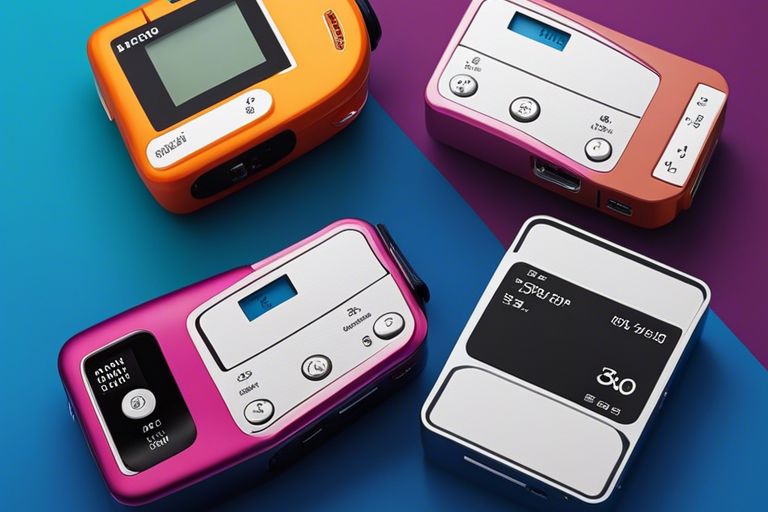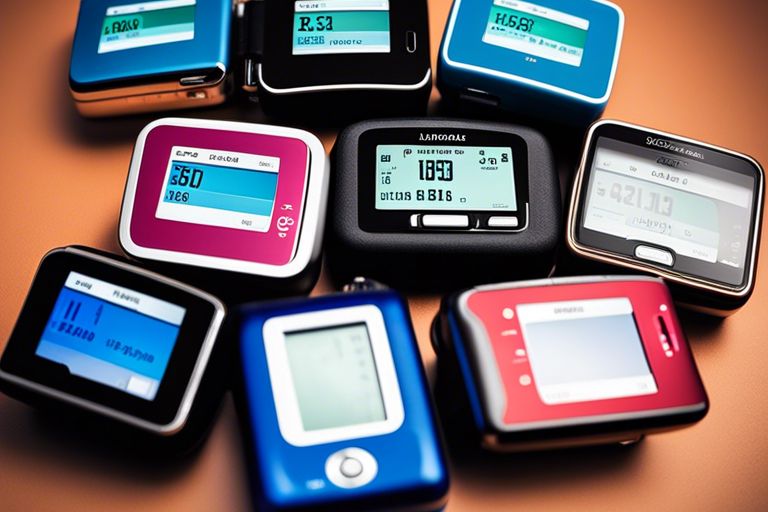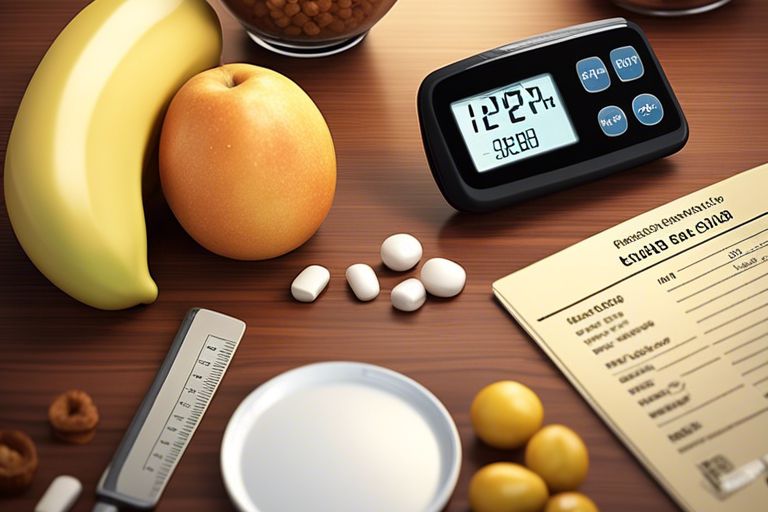Understanding the crucial role of insulin in type 1 diabetes management is paramount for individuals navigating this chronic condition. Insulin, a hormone produced by the pancreas, plays a vital role in regulating blood sugar levels. In type 1 diabetes, the body is unable to produce insulin, leading to high blood sugar levels that can have serious health implications. Managing type 1 diabetes effectively revolves around replacing the missing insulin through injections or an insulin pump. This blog post examines into the significance of insulin in type 1 diabetes management, exploring its impact on daily life and highlighting the important role it plays in maintaining blood sugar control and overall well-being.
Key Takeaways:
- Insulin is vital for managing Type 1 Diabetes: Individuals with Type 1 Diabetes require insulin to regulate their blood sugar levels as their bodies do not produce insulin naturally.
- Different types of insulin are available: There are rapid-acting, short-acting, intermediate-acting, and long-acting insulins, each with specific onset and duration times to help manage blood sugar levels effectively.
- Dosing and timing are crucial: Consistent monitoring of blood sugar levels and adherence to prescribed insulin dosages at the correct times are vital for maintaining stable blood glucose levels.
- Carbohydrate counting aids insulin management: Understanding the amount of carbohydrates in meals and adjusting insulin doses accordingly can help individuals with Type 1 Diabetes manage their blood sugar levels more effectively.
- Regular communication with healthcare providers is important: Healthcare professionals play a key role in helping individuals with Type 1 Diabetes create personalised insulin management plans and adjust treatment regimens as needed.
Understanding Insulin
Insulin Production and Function
Insulin is a hormone produced by the pancreas that plays a crucial role in regulating blood sugar levels. In individuals without diabetes, insulin helps to transport glucose from the bloodstream into the cells, where it is used for energy production. This process is vital for maintaining normal blood sugar levels and overall health.
Differences between Natural and Synthetic Insulin
Natural insulin is identical to the insulin produced by the human body, whereas synthetic insulin is engineered in a laboratory setting. Despite this difference, both types of insulin work in the same way to regulate blood sugar levels. However, there may be variations in how quickly they are absorbed into the bloodstream and how long they remain active, which can impact the management of diabetes.
It is important for individuals with diabetes to work closely with their healthcare team to determine the most suitable type of insulin for their needs. Factors such as lifestyle, activity level, and meal schedule can all influence the choice between natural and synthetic insulin to effectively manage blood sugar levels and maintain overall well-being.
Insulin Therapy for Type 1 Diabetes
Types of Insulin Treatments
Pertaining to managing Type 1 diabetes, different types of insulin treatments are available to help regulate blood sugar levels. It’s crucial to understand the various options to tailor treatment plans effectively. Common types of insulin treatments include:
| Rapid-acting insulin | Starts working within 15 minutes after injection and peaks in about 1 hour. |
| Short-acting insulin | Begins working in 30 minutes, with a peak at 2 to 3 hours. |
| Intermediate-acting insulin | Takes effect in 2 to 4 hours, peaking at 4 to 12 hours. |
| Long-acting insulin | Works gradually over 24 hours with no peak time. |
| Premixed insulin | Combines a specific ratio of rapid-acting and intermediate-acting insulin in a single injection. |
Recognising the differences in onset, peak times, and duration of these insulin types is crucial in creating an effective diabetes management plan.
Methods of Insulin Delivery
Methods of insulin delivery vary to suit individual needs. They include insulin injections using syringes, pens, or pumps. Insulin pumps deliver a continuous flow of insulin throughout the day. This method closely mimics the body’s natural insulin production, providing more control over blood sugar levels. Discuss with your healthcare provider to determine the most suitable delivery method for your treatment regimen.
Monitoring and Managing Blood Glucose Levels
Blood Glucose Monitoring Techniques
Monitoring blood glucose levels is a crucial aspect of managing Type 1 Diabetes. There are various techniques available, including self-monitoring with a blood glucose meter, continuous glucose monitoring (CGM) systems, and flash glucose monitoring devices. Regular monitoring helps individuals make informed decisions about their insulin doses and lifestyle choices.
Adjusting Insulin Dosage and Lifestyle Choices
Adjusting insulin dosage and lifestyle choices are necessary components of managing blood glucose levels effectively. It requires a thorough understanding of how different factors, such as food intake, physical activity, stress, and illness, can affect blood sugar levels. By working closely with healthcare professionals, individuals can learn to adjust their insulin dosage and make appropriate lifestyle changes to maintain optimal blood glucose control.
Challenges and Considerations
Recognizing and Managing Hypoglycemia
Hypoglycemia, or low blood sugar, is a common challenge for individuals with Type 1 Diabetes. It is crucial to recognise the symptoms, such as shakiness, sweating, and confusion, and treat it promptly with fast-acting carbohydrates like glucose tablets or juice. Regular monitoring of blood sugar levels, especially during physical activity or when skipping meals, can help prevent hypoglycemia.
Long-term Complications and Management
Long-term complications of Type 1 Diabetes, such as nerve damage, kidney disease, and eye problems, can be managed through a combination of regular medical check-ups, healthy lifestyle choices, and strict blood sugar control. It is important for individuals with Type 1 Diabetes to work closely with healthcare professionals to develop a personalised management plan that includes monitoring for and preventing these complications.
Long-term complications in Type 1 Diabetes can develop over time due to consistently high blood sugar levels. To minimise the risk of complications, individuals must maintain good blood sugar control through a balanced diet, regular exercise, medication adherence, and continuous monitoring of blood sugar levels. By proactively managing their condition, individuals can reduce the impact of long-term complications and improve their overall quality of life.
Advances in Type 1 Diabetes Care
Continuous Glucose Monitoring and Insulin Pumps
Continuous glucose monitoring (CGM) systems have revolutionised the way individuals with type 1 diabetes manage their condition. These devices provide real-time information on blood sugar levels, allowing for better control and more timely adjustments to insulin doses. Coupled with insulin pumps, which deliver precise doses of insulin throughout the day, this technology has significantly improved the quality of life for many individuals with type 1 diabetes.
The Future of Insulin Therapy
The future of insulin therapy holds promising advancements, with the development of faster-acting insulins that mimic the body’s natural insulin response more closely. Research is also focusing on the creation of ‘closed-loop’ systems, where CGM and insulin pump technologies work together seamlessly to provide automated insulin delivery based on real-time glucose readings. These innovations aim to further streamline diabetes management and reduce the burden of constant monitoring and dosing decisions on individuals living with type 1 diabetes.
The Role of Insulin in Type 1 Diabetes Management
Insulin plays a crucial role in the management of Type 1 Diabetes as it helps regulate blood sugar levels and allows cells to absorb and use glucose for energy. Without sufficient insulin, glucose levels can rise to dangerous levels, leading to various complications. It is necessary for individuals with Type 1 Diabetes to carefully monitor their blood sugar levels and administer insulin as prescribed by healthcare professionals. By following a personalised insulin treatment plan, individuals with Type 1 Diabetes can effectively manage their condition and lead a healthy life. Insulin therapy, coupled with a balanced diet, regular exercise, and frequent monitoring, is key to successfully managing Type 1 Diabetes and minimising the risk of long-term complications.
FAQ
Q: What is the role of insulin in type 1 diabetes management?
A: Insulin is a hormone that helps regulate blood sugar levels in the body. In type 1 diabetes, the body does not produce insulin, so it must be administered externally to manage blood sugar levels.
Q: How is insulin administered in type 1 diabetes management?
A: Insulin can be administered through injections using a syringe, insulin pen, or insulin pump. It is crucial for individuals with type 1 diabetes to regularly monitor their blood sugar levels and adjust their insulin doses accordingly.
Q: What are the different types of insulin used in type 1 diabetes management?
A: There are rapid-acting, short-acting, intermediate-acting, and long-acting insulins. The type and combination of insulins used depend on an individual’s insulin needs and lifestyle factors.
Q: What are the potential risks of improper insulin management in type 1 diabetes?
A: Not properly managing insulin levels in type 1 diabetes can lead to high or low blood sugar levels, which can result in serious complications such as diabetic ketoacidosis or hypoglycaemia. It is crucial to work closely with healthcare providers to develop a personalised insulin management plan.
Q: How can individuals with type 1 diabetes optimise their insulin management?
A: To optimise insulin management, individuals with type 1 diabetes should regularly monitor their blood sugar levels, follow a healthy diet, engage in regular physical activity, and work closely with healthcare providers to adjust their insulin doses as needed. Education and continuous support are key to successful insulin management in type 1 diabetes.




